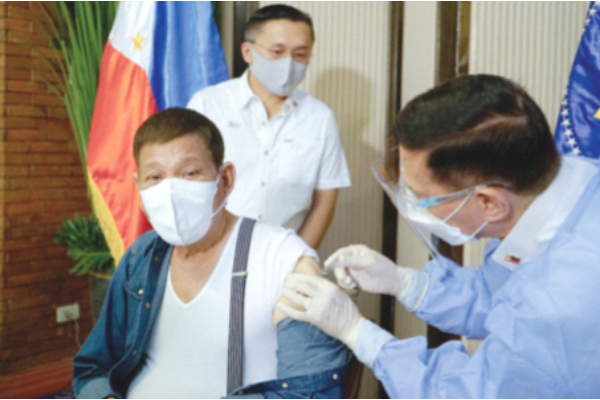Duterte given Sinopharm jab
Published on: Wednesday, May 05, 2021
By:
AFP, GMA News
 President Rodrigo Duterte (L) receiving a dose of China’s Sinopharm against Covid-19 from the Secretary of Health, Francisco Duque (R) at Malacanang Palace in Manila.
President Rodrigo Duterte (L) receiving a dose of China’s Sinopharm against Covid-19 from the Secretary of Health, Francisco Duque (R) at Malacanang Palace in Manila.
MANILA: Philippine President Rodrigo Duterte has received his first shot of a Covid-19 vaccine, weeks after saying he would waive his chance to get inoculated, as the country struggles to secure jabs amid a resurgence in infections.Officials said Duterte was given the vaccine made by China’s Sinopharm—the same one secretly administered to members of his security team last year before any shot had been given regulatory approval.
ADVERTISEMENT
In December 2020, Duterte spilled the beans about members of the PSG who were inoculated with Sinopharm vaccine smuggled into the country. It was only in February this year that the FDA granted compassionate use permit for 10,000 doses of Sinopharm vaccine for the use of PSG members.
The government officially rolled out its vaccination program against Covid-19 in March.
Presidential Security Group (PSG) Chief Jesus Durante III later confirmed the President’s information, saying PSG members inoculated themselves with Sinopharm.
A compassionate use permit, however, only allows for legal administration of Covid-19 vaccine in the Philippines and is not tantamount to the FDA endorsing the product’s safety and efficacy.
ADVERTISEMENT
Photos posted on the Facebook page of a close aide showed a masked Duterte, wearing an unbuttoned denim shirt over a white T-shirt and braces—sitting in a chair as Health Secretary Francisco Duque injected him.
“He was vaccinated not only to protect his health from Covid-19 but also to encourage our citizens to get vaccinated,” Senator Christopher “Bong” Go posted.
ADVERTISEMENT
“As a senior citizen, he was among the priority for vaccination.”
A Facebook Live video of the event cut out moments before the needle punctured Duterte’s upper left arm, but photos showed the injection.
Duterte has previously expressed confidence in vaccines made by China and Russia, even offering himself up as a guinea pig for the very first jab of Moscow’s controversial “Sputnik V”.
But last month the 76-year-old said he would forgo the opportunity to get vaccinated, arguing elderly people like him should not be prioritised.
“I feel good and I have been expecting this shot, vaccination, a long time,” Duterte said as Duque, wearing a blue medical gown, mask, face shield and latex gloves, prepared to give the injection in front of the cameras.
Sinopharm has been restricted to compassionate use only in the Philippines.
President Rodrigo Duterte is covered by the compassionate special permit (CSP) earlier issued by the Food and Drug Administration to China’s Sinopharm Covid-19 vaccine, FDA director general Eric Domingo said Tuesday.
“This is the permit that the PSG had applied for when they received a donation from China. They asked for a special permit to protect the President and it seems that it is the same one that was used for the President’s vaccination, “ Domingo said.
Aside from Duterte, Domingo said the wives and partners of Presidential Security Group members are also covered by the CSP.
So far, Domingo said there are two to three firms that have expressed their intent to apply for the emergency use authorisation (EUA) of the coronavirus vaccine developed by China’s Sinopharm Group.
However, these firms have yet to submit requirements to the FDA, including proof that they are the official supplier and distributor of the Chinese-made Covid-19 vaccine in the country.
Other vaccines being rolled out across the country of 110 million people—the Sinovac, AstraZeneca and Sputnik V jabs—have received emergency-use approval for the general public.
By May 1, just over 1.6 million first doses had been administered, while fewer than 300,000 people are fully vaccinated, government data shows.
The Philippines is battling to bring down a spike in infections that has taken its caseload to more than a million, including more than 17,500 fatalities.
Tighter restrictions in the national capital region and surrounding provinces imposed at the end of March are showing signs of working.Stay up-to-date by following Daily Express’s Telegram channel.
Daily Express Malaysia










